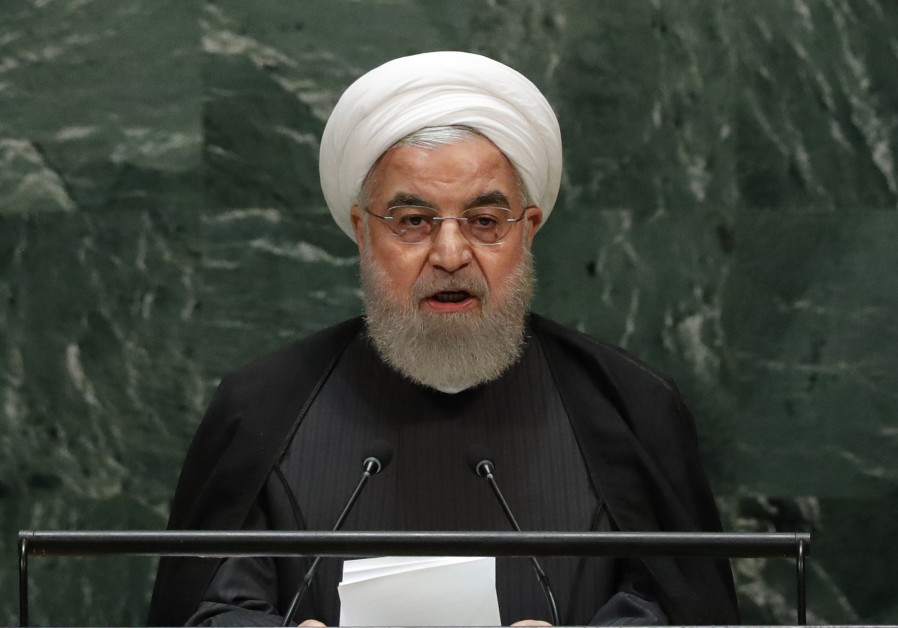Iran: International community must confront US hostility

Iran’s President Hassan Rouhani addresses the 74th session of the United Nations General Assembly at U.N. headquarters in New York City, New York, U.S., September 25, 2019. (photo credit: REUTERS/LUCAS JACKSON)
The international community must confront America’s hostile approach, Iranian President Hassan Rouhani said on Tuesday as tensions have spiked between the Islamic Republic and the United States, particularly in the aftermath of the alleged Iranian attack against Saudi oil fields on September 14.
“The international community must confront America’s hostile and unilateralist approach by taking a definitive decision and effective actions,” Rouhani said at a speech at a meeting of the Eurasian Economic Union in Armenia, according to the official IRNA news agency.
Rouhani also met with Russian President Vladimir Putin to discuss the imperiled Iranian nuclear deal and the situation in Syria, Yemen and the Strait of Hormuz.
An Iranian dissident group, the National Council of Resistance of Iran (NCRI) said Monday it had evidence of Tehran’s involvement in recent attacks on Saudi oil operations.
Washington has also pointed the finger at Iran. Earlier in the month, President Donald Trump approved sending American troops to bolster Saudi Arabia’s air and missile defenses after the largest-ever attack on the kingdom’s oil facilities.
Iran has denied any role in a series of attacks in recent months, including bombings of tankers in the Gulf and strikes claimed by the Houthis.
Saudi Crown Prince Mohammed bin Salman told the CBS program 60 Minutes broadcast on Sunday, that the attack on the Saudi oil fields was an act of war. Salman explained that it disrupted 5% of the world’s oil supplies, adding that it was an act of war.
“If the world does not take strong and firm action to deter Iran, we will see further escalations that will threaten world interests, oil supplies will be disrupted and oil prices will jump to unimaginably high numbers that we have not seen in our lifetime,” Salman said. The crown prince spoke in Arabic, but CBS translated his words. Salman told the US news program that he preferred a “political and peaceful solution” to the tensions with Iran, rather than a military one.
The crown prince also discussed last year’s killing of Saudi reporter Jamal Khashoggi in the Saudi consulate in Istanbul. Salman told CBS he ultimately bore “full responsibility” for the killing, but he denied charges that he ordered the murder. He made similar remarks to US broadcaster PBS.
Asked how he did not know about the killing by Saudi officials, he told CBS it was impossible for him to know “what three million people working for the Saudi government do daily.”
Iran’s parliamentary speaker, Ali Larijani, said on Tuesday he welcomed Salman’s willingness to resolve issues with Iran through talks.
“We welcome Mohammed bin Salman being quoted as saying he wants to resolve issues through talks with Tehran,” Al Jazeera quoted Larijani as saying.
Saudi Arabia has sent messages to Iran’s president through the leaders of other countries, an Iranian government spokesman said on Monday.
”Messages from the Saudis were presented to Hassan Rouhani from the leaders of some countries,” spokesman Ali Rabiei said, according to the semi-official ILNA news agency. “If Saudi Arabia is really pursuing a change of behavior, Iran welcomes that.”
Rabiei did not give any information on what the messages contained.
Separately, Iran’s foreign ministry spokesman said that Iran is ready to hold talks with other countries, particularly the United Arab Emirates (UAE), a regional rival.
“We are ready to hold talks with countries, especially the Emirates, in a group or separately and eliminate the misunderstandings,” Foreign Ministry spokesman Abbas Mousavi said in a weekly press conference, according to the official ministry website.
The commander of US Naval Forces Central Command visited Riyadh over the weekend to discuss with the head of Saudi Arabia’s naval forces reinforcing defenses against Iranian threats, the command said on Tuesday.
Under Washington’s proposed maritime mission, the United States would provide coordinating ships and lead surveillance efforts while allies would patrol nearby waters and escort commercial vessels with their nation’s flags.
`; document.getElementById(“linkPremium”).innerHTML = cont; (function (v, i){ });





Comments are closed.